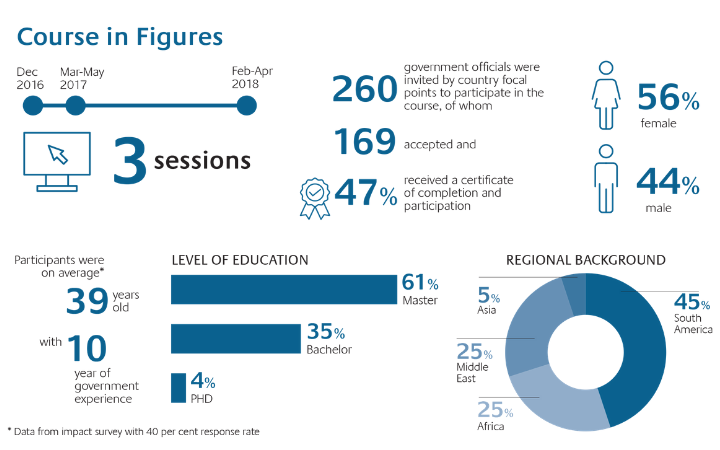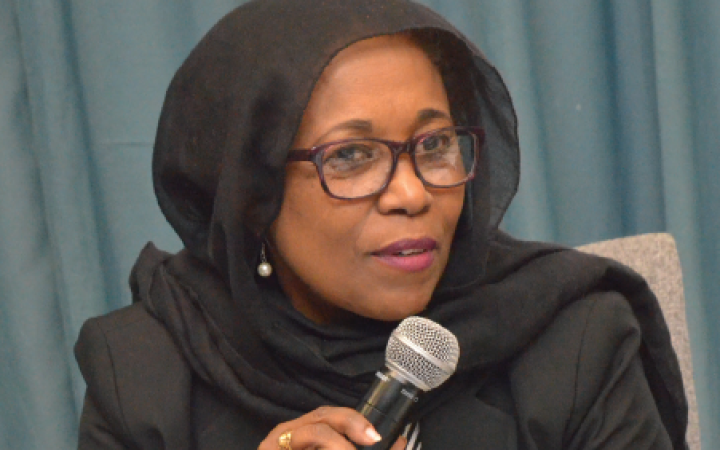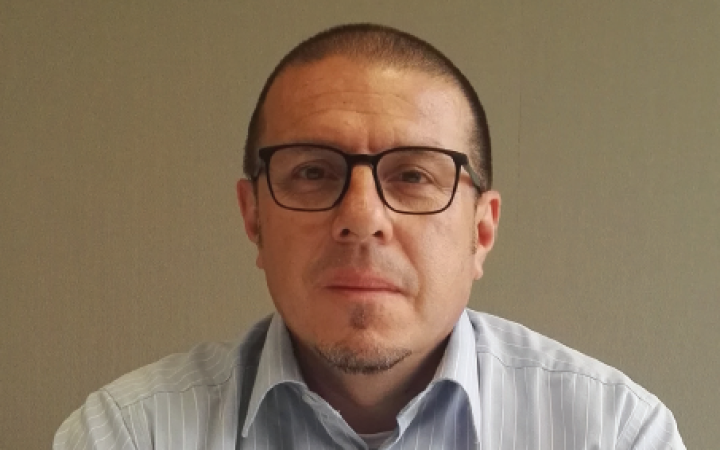Background
Further to the adoption of the 2030 Agenda in September 2015, two rounds of Voluntary National Reviews (VNRs) of its implementation have taken place at the global level in July 2016 and July 2017 in the context of the High-level Political Forum (HLPF) on Sustainable Development. More than 60 countries have already presented their Voluntary National Reviews at the HLPF. All UN Member States are expected to conduct regular and inclusive national reviews of progress on the SDGs and contribute to regional and global reviews.
This e-learning course is designed to support this process and is aimed at strengthening the capacities of Governments to engage in an effective and meaningful way with Major Groups and other Stakeholders (MGoS) as they implement and review progress towards the achievement of the SDGs. It complements a range of other capacity development activities being rolled out, among others, by UN Secretariat to meet the needs of both governments and other stakeholders with regards to the 2030 Agenda and the HLPF process.
Impact Story - Fatouma Abdallah
Ms. Fatouma Abdallah
Coordinator of the ANCAR II project
Directorate General of the Environment and Forests (DGEF), Comoros
Ms. Fatouma Abdallah participated in the March-May 2017 session of the Strengthening Stakeholder Engagement course representing her country Comoros. Her participation in the course brought about several professional and personal changes from becoming known as Madame SDG in her office to implementing trainings on the 2030 Agenda and the SDGs for civil society and other institutions.
“I knew when I familiarized myself with this new material, that it would be very useful since I [was] the head of the sustainable development department [working for the Vice-President in charge of the Ministry of the Environment]…Even though I have always worked on sustainable development, I noticed that with the training I feel much better, I feel much more confident talking about the SDGs and the 2030 Agenda.”
While Comoros has not yet presented the Voluntary National Review at the HLPF, they have already begun the process to review the national strategy for sustainable development and integrated the SDGs in the Strategy of Accelerated Growth and Sustainable Development (SCA2D). Fatouma’s confidence in preparing a VNR Stakeholder Engagement Strategy went from 5 per cent before the course to 90 per cent afterwards, which she attributes 90 per cent to her participation. She plans to apply what she learned in the course to the preparation of the VNR, specifically knowledge related to the different modes of engagement with stakeholders.£
Fatouma feels that she “understood a lot about the stakeholders and especially how to involve them” after following this course. While her increase in knowledge and skills was an intended outcome, she was also impacted by an unintended outcome. In fact, she became inspired to organize further trainings to civil society organizations, NGOs and other institutions, reaching almost 500 individuals, to raise awareness and sensitize them on the 2030 Agenda and SDGs. One of the organizations where she holds trainings to spread awareness is the Maison de l’Organisation de la Société Civile (House of the Civil Society Organization).
“The goal was to give back the training and especially to help [the participants] to better understand [the SDG process], because it is rather new to us [in Comoros], to transmit what I have learned and also sensitize them so that they know more about the SDGs and 2030 Agenda and some of them can then contribute to the writing of the report [for the VNR].”
This experience not only spread awareness on the SDGs and 2030 Agenda, but also Fatouma felt that “the more I transmit this knowledge, the more it solidifies my own understanding.” Her most significant change since participating in the course would be how she used the newly acquired knowledge and increased confidence on the SDGs and Agenda 2030 when applying for a new position in December 2017. She attributes about 40-50 per cent of her confidence growth to her participation in this course. Fatouma hopes that future sessions of the course will be held in French so that her colleagues nominated to partake would be able to follow the programme.
Quotes translated from French.
Impact Story - Ulises Rojas Pavez
Mr. Ulises Rojas Pavez
International Affairs Unit
Ministry of Social Development, Chile
Mr. Ulises Rojas Pavez partook in the Strengthening Stakeholder Engagement for the Implementation and Review of the 2030 Agenda course during its first session in December 2016. He has worked in the International Affairs Unit of the Ministry of Social Development for the past 12 years holding positions from the Unit Manager to Analyst, acquiring extensive experience in fields of international cooperation and social policies. While working for the Ministry of Social Development, Ulises was part of the Technical Secretariat responsible for preparing the Voluntary National Review for the 2030 Agenda and has focused his last four years on the process of sustainable development.
Although the Ministry of Social Development acquired years of experience in sustainable development by reviewing the Millennium Development Goals for Chile from 2000 to 2015, the 2030 Agenda posed a new challenge through its cross-cutting and multidimensional nature. With Chile’s announcement to present the VNR at the July 2017 High-Level Political Forum, the possibility to partake in an e-learning course proved very useful.
“There are several reasons why [I] participated in the course in 2016. The first reason is that we had already assumed as a country the obligation to participate in the Voluntary National Review in the second High Level Political Forum [in July 2017].”
Since UN Member States mandate for the 2030 Agenda dates back to 2015, Ulises mentions that every country which began the VNR process was coming from a zero-starting line. The Strengthening Stakeholder Engagement course impacted Ulises in the way he elaborated and prepared the VNR through acquiring a stronger sense of the meaning of the 2030 Agenda, using the tools and approaches taught in the course for the VNR preparation, and gaining insights from past experiences from countries who have already initiated processes and presented at the 2016 HLPF.
“For us [the Strengthening Stakeholder Engagement course] was very appropriate support that was not available elsewhere within UN system. It was an important proposal for the preparation of this first report…The 2030 Agenda was a great challenge. All countries started from a zero baseline since there was no experience of how to approach its implementation anywhere.”
Ulises felt he increased his confidence in preparing a VNR Stakeholder Engagement Strategy from 30 per cent before the course to 100 per cent confidence afterwards, which he claims is 90 per cent attributable to his participation in the course.
“For the course, I personally believe that it fulfilled its general objective to share successful experiences so that the future VNR countries, as was the case for Chile, would consider these experiences in the elaboration of their own processes. What one has to do in [international] cooperation is to adapt good practices and successful experiences to own realities. We understood that the applicability of these experiences is also limited, and we could not copy exactly how other countries had carried out [their own processes]. But we could adapt their approaches to our own reality and, in that sense, we take it as a progressive process which allows for improving approaches over time.”
When asked how he thinks Chile would have faired had those officials preparing the VNR did not participate in the course, “I think [the process] would have been much more complicated. [The course helped me] to understand that one of the essential things with the 2030 Agenda is that it is not a challenge of one, but rather the challenge of a set of actors—and that [in] this set of actors that are part of the same society, we have to face jointly and with responsibility what the 2030 Agenda means”.
Since participating in the course, Ulises’ most significant change in his professional career relates to how the course enlightened him on different roles civil society can have. He elaborated that this relationship that government could bridge with civil society can help bring to light the perspectives of stakeholders in not only the implementation and review for a VNR, but also within public policy.
On a personal level, his most significant change features a more global picture from years of experience in working in sustainable development. His experience has taught him that there is a before and after point for the world and that some situations are irreversible. However, Ulises emphasizes that there are processes and economic models that can help confront global challenges that affect the most vulnerable sectors. In recognizing that every country needs to commit to the 2030 Agenda, Ulises feels that his personal growth is insignificant to the global changes required for the attainment of the 17 SDGs,
Quotes translated from Spanish.
Conclusion
While the individuals who participated in the course may come from a strong background in sustainable development, in fact, 65 per cent were “involved” or “very involved” in sustainable development, their participation in the course was fundamental to improving the understanding of the concepts and meaning of both the 2030 Agenda and the SDGs.
According to an impact survey(1) conducted after the course, the average confidence to prepare a VNR Stakeholder Engagement Strategy before participating in the course was 30 per cent and 83 per cent afterwards, with respondents attributing 85 per cent of this increase to their participation in the course.
Sixty-five per cent of respondents have already applied three or more out of the six approaches they learned in the course for stakeholder engagement. Ninety-one per cent Conclusion of respondents “strongly agree” or “agree” that the course helped them to prepare a VNR that was more inclusive to vulnerable groups.
In a counterfactual scenario, these participants may have been able to continue to prepare the VNR without participating in the course. However, based on the experience shared by Ulises from Chile, the additional support from this course was indispensable for the individuals tasked to prepare a Voluntary National Review. Even if Comoros is still in the process to plan their VNR, Fatouma has made a ripple effect spreading the awareness of both the 2030 Agenda and the SDGs which will help engage more individuals to achieve the 2030 Agenda in her country. It is through learning from other countries, good practices and engaging stakeholders at different levels of the process that we can strive to implement and review the 2030 Agenda to achieve the 17 SDGs.
(1) The impact survey had 40 per cent response rate.




